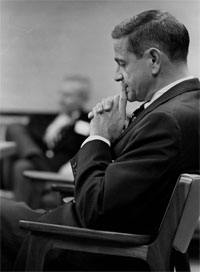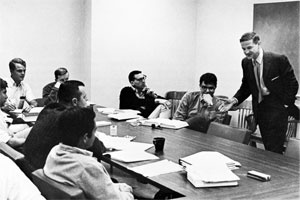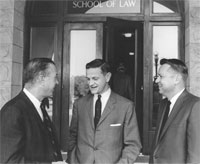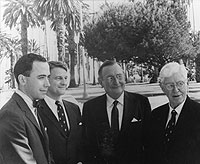Stanford Law School Mourns the Loss of Bayless Manning, Former Dean and Corporate Law Scholar

STANFORD, Calif., September 23, 2011—Bayless Manning, a former Stanford Law School dean and leading authority on corporate law, died on Sunday, September 18, 2011 at his home in Boise, Idaho. He was 88 years old.
Dean of the law school from 1964 to 1971, Manning made groundbreaking changes to the curriculum and produced scholarship that helped revise statutes governing stock appraisals during mergers and modernize rules related to capital disbursements. Among his pioneering works on corporate law, are: “The Shareholder’s Appraisal Remedy: An Essay for Frank Coker,” 72 Yale L. J. 223 (1962), which offered an influential critique of appraisal rights, leading to statutory revisions that provided a “market exemption” from appraisal for merger consideration in the form of publicly traded shares; A Short Textbook on Legal Capital (1st ed. 1968); and A Concise Textbook on Legal Capital (1st ed. 1977), which attacked the arcane rules regulating corporate distributions and drew attention to the impact of the capital market.

Dean Manning was a pioneer who advocated legal education reform to meet the changing needs of the profession and society. He promoted interdisciplinary study, especially in law, business and economics, and established the joint graduate law and business degree, the JD/MBA; he diversified the faculty by recruiting international scholars and students; he enabled law students to engage in pro bono work by creating externships in which students earned course credit for judicial clerkships, working at public-interest law firms, and more. He also started Stanford Lawyer Magazine in 1966; it now has a circulation of 15,000.
In 2008, during an oral history interview with the law school’s archivist, Manning discussed his vision for modernizing the law school curriculum during his tenure:
What had been essentially a closed picture of what law school was like in 1900, was giving way to a different world perspective… Which incidentally is still happening… The world was changing, literally. Most obviously in the technology area, but there was also an increasing awareness that American classical legal training that focused almost entirely on appellate jurisdiction, appellate argument… was giving way to a necessity for the lawyer who would be really helpful to a business man or be really helpful in fields such as technology. It was essential that he have a wider and a different kind of education. This was the platform out of which arose business school connections and the whole notion that a student could go to a business and law school at the same time and get credit in one for the other. …The law student, or the lawyer of tomorrow would have several choices of areas of specialization. One of the major ones was economics; one of the major ones was the business school or business training. The whole practice of law was changing.
“Bayless Manning was a pioneering scholar who deeply influenced corporate law,” said Larry Kramer, Richard E. Lang Professor and Dean of Stanford Law School. “And the curriculum changes he made as dean in the 1960s were well ahead of their time. He played a pivotal role in the transformation of Stanford Law School into a leading national institution. The values he stood for have become core to our institutional identity.”

Manning was also a prominent scholar in legal ethics. In the 1950s, he served as the staff director for the New York City Bar Association’s influential study of federal conflicts of interest law and after its publication in 1960, on the President’s Advisory Panel on Ethics and Conflicts of Interest in Government. The bar study, along with the panel’s work, served as the basis for reform legislation enacted in 1962. He also authored a treatise on the evolution of the federal conflict of interest statutes,Federal Conflicts of Interest Law (1964). He was honored for his work by the U.S. Office of Government Ethics for the Executive Branch with a Certificate of Meritorious Achievement in 2001.
Born in Bristol, Oklahoma, Manning spent much of his childhood in Washington, D.C. and later attended B.M.C. Durfee High School in Fall Rivers, Massachusetts. At 19, he became one of the Army cryptanalysts who during World War II helped break the Japanese naval code, which helped the United States win a military victory at Midway. He studied law at Yale University, where he graduated first in his class in 1949 and was Editor-in-chief of the Law Journal. Following law school, he clerked for Associate Justice of the United States Supreme Court Stanley Reed.

From 1956-64 Manning was professor of law at Yale Law School. He helped to organize the Peace Corps program in Latin America, did research for the CIA, helped to draft the 1962 Trade Extension Act, toiled for NATO on the problems of a multinational nuclear force. At the conclusion of his deanship at Stanford in 1971, he became the first full-time executive of the Council on Foreign Relations, assuming a newly created post of president. He next joined the New York law firm of Paul, Weiss, Rifkind, Wharton & Garrison and later started a consulting firm.
“Bayless Manning was a Renaissance man, a visionary,” said John Henry Merryman, the Nelson Bowman Sweitzer and Marie B. Sweitzer Professor of Law, Emeritus, an internationally renowned expert on art and cultural property law who wrote his most successful and popular book, The Civil Law Tradition: An Introduction to the Legal Systems of Western Europe and Latin America at the urging of Dean Manning. “He was a respected and effective dean, a leading scholar in his field of corporate law, and he uniquely understood that the study of the law could no longer be confined to a single discipline—that the law influenced and was influenced by economics, history, medicine, and the arts, and that law graduates should be and would be, like him, capable of many great things.”
Manning is survived by his wife Alexandra Zekovic, five children, and six grandchildren.
